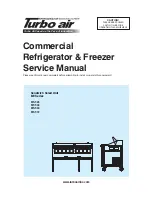
Freezing food; storing frozen food
Page EN-19
WARNING
Danger of explosion!
Improper handling of the appliance
may lead to an explosion.
■
Do not store explosive substances,
such as aerosol cans with a fl amma-
ble propellant, in this appliance, as
they can form ignitable gas-air mix-
tures.
CAUTION
Health hazard!
Incorrect handling, insuffi cient cool-
ing or overlapping items can spoil the
stored food. This could lead to a risk of
food poisoning when consumed.
■
In particular, pack raw meat and fi sh
carefully to ensure that adjacent
food cannot be contaminated by sal-
monella or similar bacteria.
■
Abide by the storage times recom-
mended by food manufacturers.
■
Note that the shelf life of the frozen
food may be shortened due to a rise
in the temperature inside the appli-
ance (from defrosting, cleaning or
power failure).
■
If there is a power failure, the frozen
food may remain suffi ciently cold for
some time. In case of prolonged pow-
er failure or malfunction of the appli-
ance, remove the stored frozen food
from the appliance and store it in a
suffi ciently cool place or in anoth-
er cooling appliance. The maximum
storage time in the event of a fault is
shown on the appliance’s type plate.
■
After a malfunction, check wheth-
er the stored food is still edible. Con-
sume thawed and defrosted foods
immediately and do not refreeze.
Risk of injury!
Improper handling of the appliance
may result in injury. Risk of burns caused
by low temperatures.
■
The food and the inside walls of the
freezer have a very low temperature.
Never touch them with wet hands.
This can cause injury to the skin. Skin
damage can occur even with dry skin.
■
Let ice cubes or ice lollies thaw a little
before eating, do not put them into
your mouth straight from the freezer.
If there is not enough space within the
drawers of the fridge, you can remove
the drawers.
• Follow the instructions in this chapter to
store your food for the longest possible
time in the best possible way.
Freezing food
Freezing means reducing the core tempera-
ture of fresh, room-temperature food to fro-
zen as quickly as possible – for best results
“flash-frozen”. If not cooled quickly enough,
the food will be “killed by frost”, i.e. the struc-
ture will be destroyed. A constant storage
temperature of –18 °C is needed to maintain
the food’s consistency, taste and nutritional
value.
Freezing food has a positive effect on its shelf
life. This will also help you avoid food waste.
• Set the temperature in the freezer to
–18 °C and fill it in such a way that the
temperature conditions inside are opti-
mally utilised, guaranteeing optimal food
storage:
Freezing food; storing frozen food
Содержание HSBS17590CI
Страница 72: ......
















































